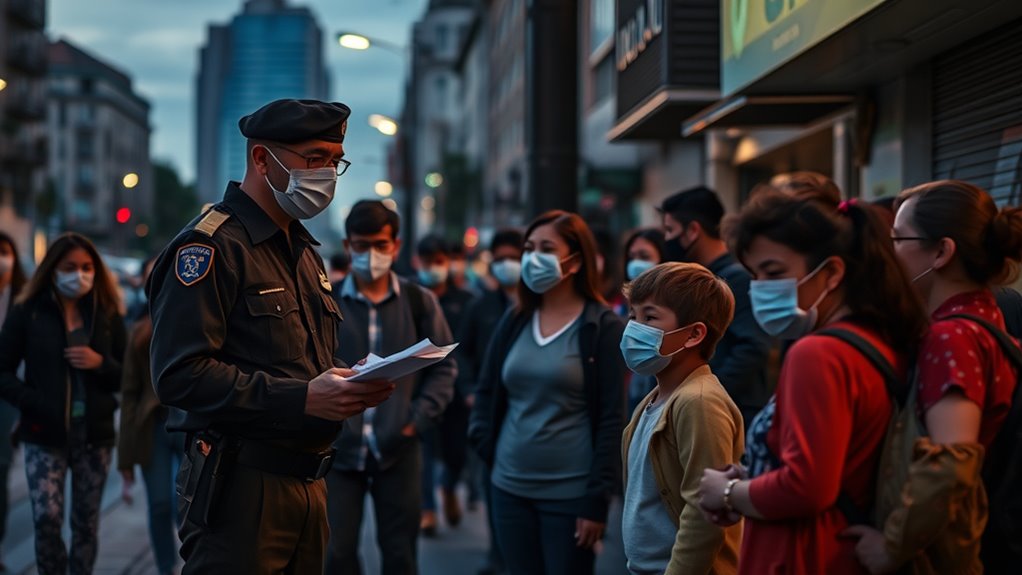Enforcing quarantines during pandemics involves balancing public health needs with respecting individual rights and privacy. You must consider ethical issues like data collection transparency, protecting vulnerable populations, and ensuring fairness across different communities. Cultural sensitivity and equitable resource distribution are crucial to avoid bias or mistrust. Legal frameworks guide lawful enforcement, while compassionate policies build community resilience. To navigate these complex challenges responsibly, you’ll find valuable insights if you continue exploring this important topic.
Key Takeaways
- Balancing public health benefits with respect for individual privacy and personal liberties.
- Ensuring equitable enforcement that considers resource disparities and cultural sensitivities.
- Maintaining transparency about data collection, surveillance practices, and potential biases.
- Protecting vulnerable groups from discrimination, stigmatization, and social inequalities.
- Developing ethical policies that uphold human rights while effectively managing quarantine measures.
Balancing Public Health and Personal Freedoms

Balancing public health needs with individual freedoms is a complex ethical challenge when enforcing quarantines. To navigate this, community engagement becomes essential. By involving local leaders and residents in decision-making, you foster transparency and demonstrate respect for personal liberties. Building public trust encourages compliance, making quarantine measures more effective. When people understand the reasons behind restrictions and see their concerns addressed, they’re more likely to cooperate willingly. Clear communication about the importance of protecting community health helps strike a balance between safeguarding public well-being and respecting individual rights. Ultimately, fostering an inclusive approach ensures that health interventions are ethically justified and socially acceptable, creating a foundation of trust that can withstand the pressures of a public health crisis. Incorporating well-being tips from diverse groups can further enhance community resilience and cooperation.
Privacy Concerns and Data Collection

When authorities collect data during quarantines, you face risks to your privacy and personal information. You might also question how transparent they are about surveillance methods and data use. It’s crucial to reflect on whether these practices respect your rights while protecting public health. Additionally, implementing security systems can help safeguard your personal data from potential breaches or misuse. Ensuring the use of certified ingredients in public health measures can promote trust and safety in the interventions employed. Understanding the importance of attention in creative practice can also inform how we approach transparency, emphasizing the need for careful oversight and responsible data management. Incorporating holistic health principles, such as mental and emotional well-being, can further guide ethical data collection practices in public health measures. Recognizing the significance of Pimple Patch technology can also provide insights into targeted interventions and their ethical considerations.
Data Privacy Risks
Have you ever considered how quarantine enforcement relies on collecting vast amounts of personal data? This raises significant data privacy risks. If data isn’t properly protected, sensitive information could be exposed or misused. Implementing data anonymization helps protect identities by removing personal identifiers, reducing the risk if data leaks occur. Encryption protocols add another layer of security, ensuring that data remains unreadable to unauthorized parties during transmission and storage. However, even with these safeguards, there’s always a chance of breaches or misuse, especially if protocols are weak or improperly applied. Color accuracy and precise calibration are essential for ensuring the effectiveness of visual displays, which can be compromised if data privacy protocols are not adequately maintained. Additionally, ongoing privacy regulations are crucial to adapt data handling practices to emerging threats and technological advancements, ensuring continued protection of personal information. The use of natural materials in designing systems can also influence the overall security and integrity of data management processes. Moreover, establishing comprehensive data governance policies is vital for maintaining accountability and transparency in data handling. You must weigh the benefits of data collection against the potential privacy violations, making sure that data privacy risks are minimized without compromising public health efforts. Moreover, adopting robust security measures can further mitigate vulnerabilities and enhance data protection.
Surveillance Transparency Issues
While protecting personal data through anonymization and encryption helps mitigate privacy risks, concerns about transparency in surveillance practices remain prominent. You may worry about how authorities collect and use your data, especially if algorithms introduce bias—known as algorithmic bias—that can unfairly target specific groups. Lack of transparency about surveillance methods can erode trust, making it harder to justify quarantine measures. Additionally, data security must be prioritized to prevent breaches that could expose sensitive information. When agencies are unclear about their data collection practices, it raises ethical questions about accountability and consent. Ensuring transparent communication about what data is collected, how it’s used, and how biases are managed is essential to balancing public health needs with individual rights. Moreover, understanding Glycolic Acid Benefits for Skin can help in evaluating skin-related privacy concerns linked to personal health data collection. Transparency in data practices is crucial to address surveillance transparency issues effectively and uphold ethical standards.
Equity and Fairness in Quarantine Enforcement

As you consider quarantine enforcement, you must recognize how resource disparities can lead to unequal treatment. Cultural differences also pose challenges in ensuring respectful and appropriate measures for all communities. Addressing these issues is essential to promote fairness and prevent discrimination during public health responses. Moreover, understanding the importance of privacy and cookie usage can help in designing policies that respect individual rights while maintaining effective quarantine measures. Incorporating insights from digital literacy programs can further support equitable communication strategies across diverse populations. Recognizing the impact of cost disparities in enforcement resources can ensure more equitable implementation across different regions. Additionally, understanding how diversification of assets can influence public trust may help in designing more inclusive quarantine policies that consider community-specific needs. Considering cost and budgeting strategies can also optimize resource allocation and improve enforcement efficiency in various settings.
Resource Allocation Disparities
Resource allocation disparities often expose the stark inequities in quarantine enforcement, raising questions about fairness and justice. When resources are limited, decisions around resource prioritization can favor wealthier areas, leaving vulnerable communities underserved. Funding inequalities mean some regions have better access to testing, protective gear, and enforcement personnel, creating uneven safety standards. You might notice:
- Wealthier districts receive quicker testing and support
- Underfunded areas struggle with enforcement and supplies
- Essential services are unevenly distributed, impacting quarantine compliance
These disparities challenge ethical principles of fairness, as marginalized groups face greater risks and fewer resources. Ensuring equitable resource distribution requires addressing funding inequalities and prioritizing vulnerable populations to promote just quarantine enforcement. Additionally, public awareness about these disparities is crucial to advocate for more equitable policies and resource allocation. Recognizing the importance of resource availability can help in understanding how disparities impact enforcement efforts and outcomes.
Cultural Sensitivity Concerns
Disparities in resource allocation can lead to cultural insensitivities that undermine quarantine efforts. When authorities overlook cultural differences, it can cause cultural misinterpretations that erode trust and cooperation. Language barriers exacerbate these issues, making it difficult to communicate quarantine guidelines clearly and respectfully. If messaging isn’t culturally sensitive or translated accurately, communities may feel misunderstood or unfairly targeted. This miscommunication can also be compounded by misinformation about essential health practices, leading to confusion and mistrust. Additionally, cultural competence among public health officials can significantly improve compliance and understanding. Incorporating culturally appropriate communication strategies, such as engaging community leaders and utilizing familiar messaging, can foster better relationships and cooperation. Recognizing and respecting cultural nuances helps guarantee that quarantine enforcement is perceived as fair and empathetic, fostering cooperation rather than resistance. To support this, understanding the importance of cultural sensitivity in public health initiatives is essential for effective pandemic response. Enhancing cultural awareness among officials can further bridge gaps and promote equitable health practices. Ultimately, cultural sensitivity is vital to maintaining equity and fairness in pandemic responses.
Equal Treatment Challenges
Ensuring equal treatment in quarantine enforcement can be challenging when authorities overlook systemic inequities, leading to perceptions of unfairness. Without deliberate community engagement, certain groups may feel targeted or neglected. Cultural competence is essential to address these disparities and foster trust. To promote fairness, consider:
- Engaging diverse communities in decision-making processes
- Tailoring communication strategies to cultural contexts
- Training enforcement personnel on cultural awareness and bias
Addressing Vulnerable Populations

Vulnerable populations often face unique challenges when it comes to quarantine enforcement, making it crucial to tailor strategies that protect their rights and well-being. Cultural stigmatization can lead to discrimination and social exclusion, discouraging individuals from seeking help or cooperating with health measures. Language barriers further complicate communication, causing misunderstandings and preventing proper access to information and resources. To address these issues, you must ensure that public health messages are culturally sensitive and available in multiple languages. Engaging community leaders and using interpreters can foster trust and understanding. Recognizing and respecting cultural differences while providing clear, accessible information helps ensure vulnerable populations are supported, not marginalized, during quarantine enforcement. This approach promotes ethical, effective pandemic responses.
Socio-economic Impacts of Quarantine Measures

While addressing the needs of vulnerable populations is essential for ethical quarantine enforcement, it’s equally important to deliberate how quarantine measures impact your economic stability. The economic repercussions can be severe, especially for those already facing social inequalities. You may experience lost income, job insecurity, or difficulty accessing essential services. Quarantines can exacerbate existing disparities, pushing marginalized groups further behind.
- Small business closures and unemployment spikes
- Increased food insecurity among low-income households
- Limited access to healthcare due to financial or logistical barriers
These issues highlight that quarantine measures, if not carefully managed, can deepen social inequalities and threaten your overall well-being. Balancing public health with economic stability remains a critical ethical concern.
Legal Frameworks and Human Rights Considerations

Legal frameworks and human rights considerations play a essential role in shaping how quarantine measures are implemented and enforced. You need to understand that legal precedents set by past cases influence current policies, ensuring they align with established rights. These frameworks balance public health needs with individual freedoms, preventing abuses and safeguarding human dignity. Human rights advocacy groups actively challenge overly restrictive or unjust quarantine practices, pushing for policies that respect personal liberties while protecting community health. You should recognize that laws vary across jurisdictions, but a common goal remains: to ensure quarantine enforcement is lawful, transparent, and proportionate. By grounding actions in legal principles and human rights standards, you help maintain public trust and uphold ethical integrity during health emergencies.
Ethical Decision-Making in Policy Implementation

Implementing quarantine policies requires careful ethical decision-making to balance public health priorities with respect for individual rights. You must weigh the importance of informed consent, ensuring people understand and agree to restrictions, against the need for swift action during emergencies. Ethical diplomacy plays a crucial role, fostering trust and cooperation between authorities and communities. To navigate these challenges, consider:
- Ensuring transparent communication about quarantine reasons and procedures
- Respecting autonomy while safeguarding public health
- Promoting dialogue to build trust and mutual understanding
Frequently Asked Questions
How Do Cultural Differences Influence Quarantine Enforcement Ethics?
You find that cultural perceptions heavily influence how quarantine enforcement ethics are viewed and applied. In some cultures, collective well-being is prioritized, making strict quarantine measures more acceptable. Others emphasize individual rights, leading to debates about ethical relativity. These differences shape policies and public acceptance, requiring you to navigate diverse values carefully. Recognizing these cultural nuances helps you implement more ethical and effective quarantine strategies worldwide.
What Role Do International Laws Play in Quarantine Ethics?
You should understand that international laws guide quarantine ethics by emphasizing legal compliance and respecting sovereign authority. These laws help guarantee countries enforce quarantine measures fairly and consistently, balancing public health needs with individual rights. They also provide frameworks for cooperation and accountability, preventing arbitrary actions. By adhering to international standards, you promote ethical quarantine enforcement that respects national sovereignty while safeguarding global health.
How Can Public Trust Be Maintained During Enforced Quarantines?
To maintain public trust during enforced quarantines, you should focus on open communication and community engagement. Use transparency strategies to share clear, honest information about the reasons for quarantine measures and expected outcomes. When people feel informed and involved, they’re more likely to cooperate. Building trust also means listening to concerns and addressing them promptly, which helps foster a sense of shared responsibility and respect during challenging times.
What Ethical Considerations Arise From Digital Contact Tracing?
You face a dilemma with digital contact tracing—balancing public health benefits against privacy concerns. While it helps slow the spread, you must consider data security and how personal information is preserved and shared. Ethical considerations demand transparency about data use, consent, and safeguards. You need to guarantee that technology doesn’t infringe on individual rights, even as it aims to protect the community.
How Are Informed Consent Principles Applied in Quarantine Measures?
When applying informed consent principles in quarantine measures, you should guarantee individuals understand the reasons, duration, and implications of quarantine. Address privacy concerns by clearly explaining how personal data is used and protected. Respect autonomy rights by obtaining voluntary consent whenever possible, and provide options or alternatives. By doing this, you help individuals make informed decisions, balancing public health needs with respect for personal privacy and autonomy.
Conclusion
As you navigate enforcing quarantines during pandemics, remember that striking a balance is key. Respect individual rights while protecting public health, and treat everyone fairly—no one should be left behind. Recognize the vulnerabilities and socio-economic impacts at play, ensuring policies don’t become a wolf in sheep’s clothing. By making ethical decisions, you can steer through these choppy waters without losing sight of human dignity, because sometimes, the best course is to walk a tightrope with care.










